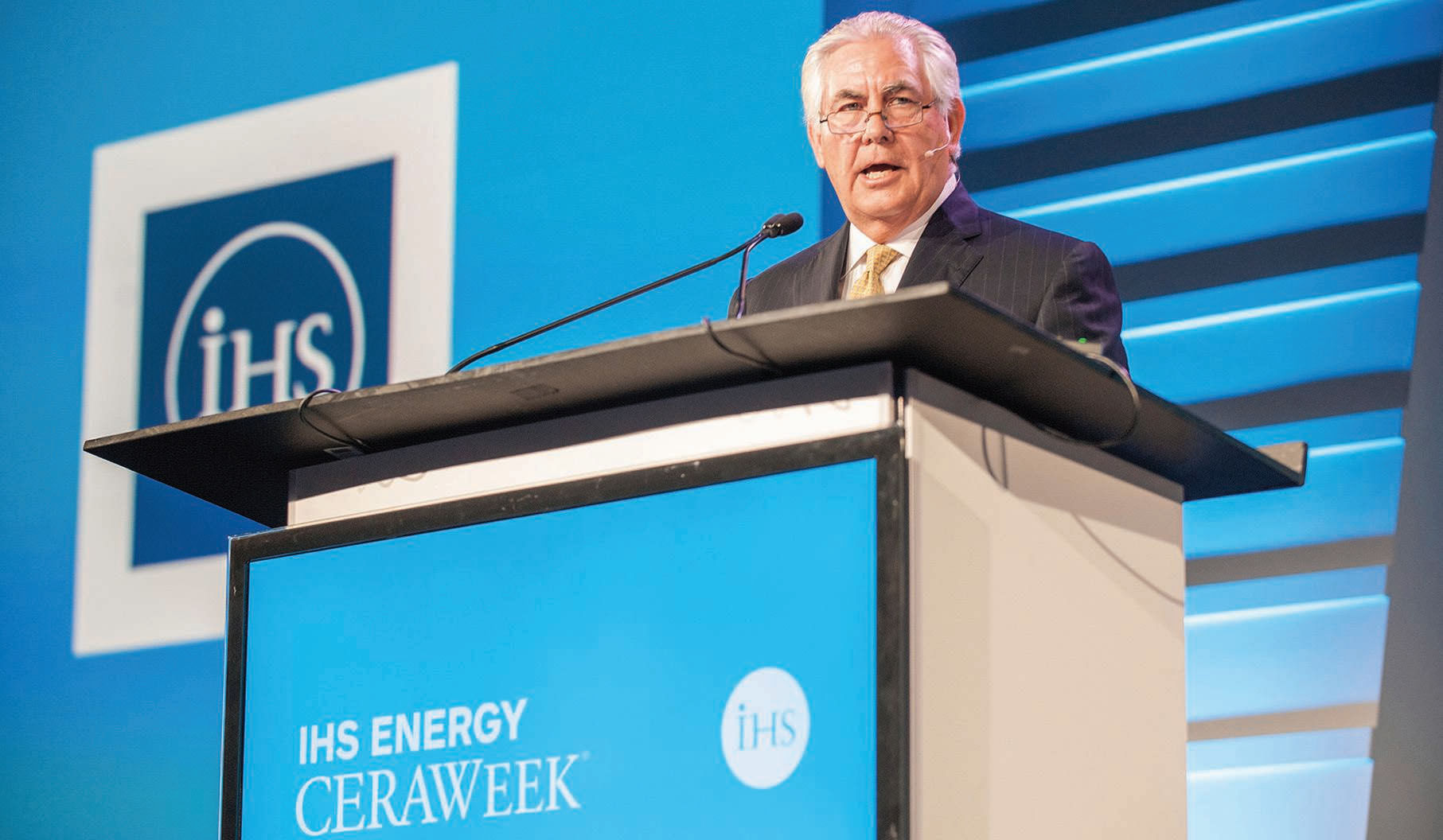
Lafourche’s Top Taxpayers
September 29, 2015
Local emerges as World Champion
September 30, 2015Exxon Mobil Corporation Chairman and CEO Rex W. Tillerson cites four policy changes that could stimulate new investment, increase job creation, boost oil and gas production, and provide greater environmental protection.
A technological revolution that has created an era of energy abundance could benefit society even more with the help of 21st century energy policies.
Chairman and CEO Rex W. Tillerson, speaking at the 2015IHS CERA conference in Houston, said that the energy industry and the United States have reached a turning-point moment in history. At the same time, a “new world” is being created across the transformed energy landscape whose full parameters remain to be determined.
Rex Tillerson, Chairman and CEO ExxonMobil, speaks at the 2015 IHS CERA conference.
“For nearly all of us in the energy sector, these abundant new supplies and the resulting decline in prices have created new pressures that will demand increased discipline and focus,” Tillerson said. “But for consumers and the economy, there have already been significant benefits.
“New supplies of energy have created and supported millions of jobs, led to a renewal of manufacturing and increased government revenues – all during a severe recession and through a period of anemic economic growth.”
Tillerson noted that the energy industry has shown just a fraction of what scientific and engineering advances can mean for the safety and progress of society.
“Unfortunately, as much as our investments and technologies are shaping – and will shape – the 21st century, our industry continues to struggle under the weight of policies that are products of 1970s thinking. This must change.”
Tillerson said that if society is to benefit fully from the technology revolution at this turning-point moment, the United States will need “energy policies worthy of the science and engineering and entrepreneurial daring that have redefined the modern energy landscape.”
He added that optimistic policies are required that reflect the shared aspirations of industry and society for energy and environmental protection, and that appreciate the power of free markets to create revolutionary innovations.
Further, these policies must proceed with the conviction that a new world is best constructed on free trade and global cooperation.
Tillerson cited four areas where policy changes would ensure that North American technologies and supplies contribute to increased energy security, diversity and flexibility.
“First, we need governments to recognize that our advanced technologies and techniques have been thoroughly proven in some of the most delicate ecosystems and harshest conditions on Earth.”
Tillerson noted that this was one of the implications of the Arctic Research Study, produced by the National Petroleum Council at the request of Dr. Ernest Moniz, secretary of the U.S. Department of Energy.
As chair of this collaborative effort, Tillerson said the study found that U.S. arctic oil and natural gas resources can contribute significantly to enhancing national and global energy security, and that its potential can be developed using existing technologies.
“The political challenge will be to act on the collaborative and science-based findings of the study and open the U.S. Arctic to field-proven technologies and cutting-edge techniques.”
Second, Tillerson said that the U.S. government should promote free trade in natural gas and crude oil, “as we do for virtually every other good manufactured in the United States.
“Whether we are talking about the export of liquefied natural gas [LNG] or ending the ban on crude oil exports, economists and leaders from across the political spectrum agree that free trade in energy will lead to increased investment, increased job creation and increased energy production.”
Tillerson added that permitting LNG exports would also allow the United States to contribute to further reductions in greenhouse gases and pollution by enabling more nations, especially the dynamic economies of Asia, to turn to cleaner-burning natural gas.
A third policy change is approval of such critical infrastructure projects as the Keystone XL pipeline.
Tillerson said that the pipeline would do more than deliver oil from Alberta, Canada, and North Dakota’s Bakken Shale to refiners on the U.S. Gulf Coast.
“It would improve U.S. competitiveness, increase North American energy security, and strengthen the relationship with one of our most important allies and trading partners.”
Finally, transparency and certainty are needed in the regulatory process.
“The delays and political machinations that have delayed the Keystone XL pipeline are the poster child for a much deeper problem hindering progress and advancement in this country. Regulatory complexity increasingly burdens companies and investors with expensive delays, onerous reworks, unnecessary duplication, and extended and costly legal wrangling.”
Tillerson added that it is a “fundamental tenet of good government that leaders and policymakers provide a clear and certain pathway to regulatory compliance.”
He concluded by saying that energy policy will increasingly be at the center of public discussions and debate.
“It will be up to the leaders in our industry to tell the extraordinary story of how human ingenuity and innovation can transform the energy sector – and the world – for the better. We have achieved so much in the past decades. But with sound policies, we can enable more investment, which will enable new technologies.
“And with the ability to invest confidently and efficiently, we will find new ways to deliver energy in a way that is safe, secure and reflects our highest ideals for individual opportunity, economic growth and wise stewardship of the environment. In doing so, we can sustain our quality of life and lift millions out of poverty.”
Rex Tillerson, CEO of Exxon-Mobil, discusses how government and the oil and gas industry need to work together for mutual public benefit.










